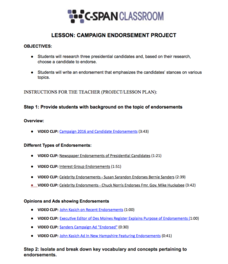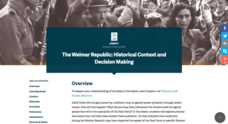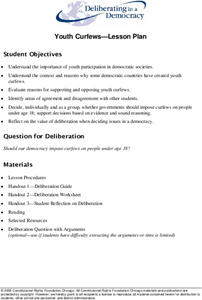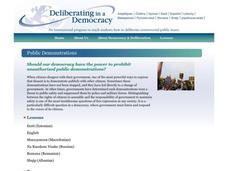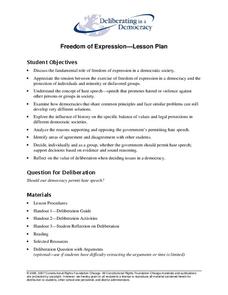C-SPAN
Campaign Endorsement Project
So many politicians, so many endorsements! Learn to differentiate between facts as well as the process of endorsements with an informative resource. Class members watch current endorsement videos, research candidates from three different...
Deliberating in a Democracy
Marriage and the State
What defines marriage in society? Scholars investigate the moral and legal arguments of what defines marriage. They analyze different marriage traditions and social customs around the world along with Supreme Court decisions. Individuals...
Facing History and Ourselves
Laws and the National Community
When it comes to the law, is justice always served? Teach scholars about how law sometimes enables prejudice of entire groups of people with a unit on World War II that includes a warm-up activity, analysis of primary sources,...
Facing History and Ourselves
Do You Take the Oath?
Why did so many go along with Nazi policies during World War II? An investigatory unit includes four handouts, reading analyses, classroom discussion topics, and intriguing philosophical questions, helping learners understand the...
Facing History and Ourselves
The Weimar Republic: Historical Context and Decision Making
Did you know that way before Hitler became a dictator, he actually spent nine months in a German jail? Provide the background for the escalating point before the Nazi party took over in World War II through the exercises in the resource....
Facing History and Ourselves
Us and Them: Confronting Labels and Lies
Stereotyping and discrimination based on religion catalyze many atrocities in the world. Explain the awful treatment of Jews and the lies Nazis spread by using an informative yet sensitive resource. Learners participate in a warm-up and...
University of California
Containing Communism Abroad
Learn more about the policy of the United States to contain communism during the Cold War. The fifth installment of an eight-part series looks at primary and secondary materials about a challenging time in history. After analyzing the...
Deliberating in a Democracy
Youth Curfews
Don't stay out too late! Scholars analyze the need for youth curfews in a democratic society. They examine primary documents, case studies, and short video clips to form their opinions and take a position on the issue. Holding a class...
Deliberating in a Democracy
Surveillance
Big Brother is always watching you! Scholars analyze the impact security cameras have on the legal system in a democracy. Primary documentation, case studies, and video clips investigate the use of video in prosecution and provide an...
Deliberating in a Democracy
Recycling
How often have you passed by a recycling container in your school? Scholars research the issue of recycling in the ever-changing global world. Using documentation and video evidence, they form their own opinions on recycling and how it...
Deliberating in a Democracy
National Service
Uncle Sam wants you to serve! Scholars investigate the role of mandatory national service in an open democracy. They research, watch a video, and hold a debate surrounding the issue of requiring one year of service to gain a better...
Deliberating in a Democracy
Juvenile Justice
Pupils compare and contrast the legal system as it pertains to juvenile and adult crime and punishment. Incorporating primary documents, legal decisions, and video evidence, individuals form an argument debating the treatment of...
Deliberating in a Democracy
Preventive War
"Those who knocked these buildings down will hear from all of us soon!" - George W. Bush. Scholars investigate and analyze the events of September 11, 2001 in ushering in the Bush Doctrine on foreign policy. Using primary documents as...
Deliberating in a Democracy
Parental Liability
How many teenagers have wanted their parents to let them make their own decisions? The answer is ... all of them! Scholars investigate where parental liability begins and ends in the eyes of the law. Using case studies and legal...
Deliberating in a Democracy
Public Demonstrations
Have you ever fought publicly for an idea you believe in? Scholars research and analyze the right to demonstrate peacefully. Incorporating different real-life scenarios as well as legal decisions exposes the concept of democracy and free...
Deliberating in a Democracy
Globalization and Fair Trade
Have you ever traded something? How do you know you got a good deal? Scholars use case studies and research to determine the role of globalization in fair trade. Class members examine consumer demand and competition bring to light the...
Deliberating in a Democracy
Freedom of Expression
Should democracies include hate speech as a protected right? Scholars analyze the rights found under the First Amendment to the Constitution through researching evidence. Freedom of expression becomes the focal point of the...
Deliberating in a Democracy
Crime and Punishment
Should the United States ban the death penalty? Scholars use real-life examples of criminal activity to come to their own conclusions on the death penalty. Primary source documents, as well as video clips, open the issue of capital...
PBS
1000 Words
A picture really can speak a thousand words—no matter how old! Scholars become history detectives as they learn how to analyze historical photos and evidence to uncover the past. The fun hands-on activity makes history come alive through...
PBS
WWII: Detained
Imagine being forced against your will behind barbed wire for doing nothing but being yourself. Scholars investigate the impact Japanese-American internment camps had during World War II. Through video and archival evidence, they create...
University of California
The End of the Cold War (1979-1991)
Scholars use primary and secondary documents, as well as video evidence, to investigate the end of the Cold War. After completing the final installment of an eight-part series, class members better understand the issues surrounding the...
University of California
The Vietnam War (1945 – 1975)
Have you ever wanted to do something so perfectly you wound up not doing it well at all? Young historians use primary and secondary documents to analyze the United States involvement in the Vietnam War. The issues surrounding the...
University of California
Anti-Communism at Home
Have you ever been accused of something without cause? The sixth installment of an eight-part series asks scholars to create a museum exhibit on the anti-communist activities in the United States at the start of the Cold War. To make...
Facing History and Ourselves
Justice After the Holocaust
Though there could be no true justice for the horrors of the Holocaust, many of those responsible for crimes against humanity were found guilty in the eyes of the law. Using primary and secondary sources in the 16th installment of a...


